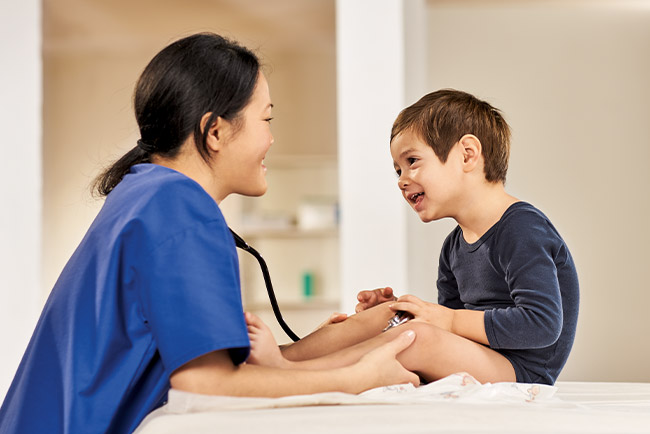You have successfully logged out.
Not registered yet?
Minimising Risk in Paediatrics & Neonatology
Minimising Risks in Paediatrics & Neonatology is Crucial

Medical Professional
This information is meant for medical professionals only. Please confirm that you are a medical professional before accessing the information.
Confirm Yes, I am a health care professional. Cancel No, I am not a health care professional.Minimising Risks in Paediatrics & Neonatology is Crucial
Paediatric patients are a special group in hospital treatment. They have unique needs compared to adult populations. Paediatric patients are not small adults – due to their physiological development, age, and size they require a special level of care and attention. B. Braun offers a dedicated portfolio of both medical devices and drugs for this patient group.
Minimising risk is even more important in paediatrics, since significant risks such as air embolism, overdose or drug incompatibility may be life-threatening for small patients.
In fact, paediatric patients are more susceptible to errors, especially medication errors, their physiologic reserve is considerably less than in adults. Read on for more about risks during hospitaliaation for paediatric patients.

Recognising Risks in Paediatric and Neonatal Care
Small patients. Huge responsibility. Let's protect paediatric patients… together.
Protecting children is instinctual to us. Parents are even more attuned to this instinct. For paediatric health care professionals, protecting and preventing harm in small patients is not only a daily task but sometimes a real challenge.
Despite increasing awareness of patient safety, patient harm is still common.1
“Errors still affect as many as one-third of all hospitalized children and an unknown number of children in ambulatory settings.”
Minimising risk remains an important concern in paediatrics today. On the following pages, you’ll learn more about the most common risks in pediatric and neonatal care and how to reduce them.
Minimising risk in Paediatrics & Neonatology
Other Risk Factors for Paediatric Patients
Minimising the Risk of Microbial Contamination
-
Microbial Contamination
0Mio
people worldwide suffer from infectious complications associated with health care.3
Microbial contamination is one of the most dangerous risks for patients in hospitals. There is a broad range of pathogens that can cause contamination and lead to infection. Premature neonates with lower innate immune function and decreased maternal antibodies are particularly at risk.
Microbial contamination was found in a study of repackaged injectable lipid emulsions in neonatal intensive care patients. The pathogens "Klebsiella pneumoniae" and "Candida albicans" were found with particular frequency.4
B. Braun offers products that help reduce the risk of microbial contamination.
Want to know more about the risk of microbial contamination?
Reducing the Risk of DEHP Exposure
-
The PVC used in medical devices contains between 20% and
0%
DEHP by weight
Diethylhexyl phthalate, known as DEHP, is a plasticizer used in PVC plastics and has been linked to adverse effects in critically ill neonates and in pregnant or breastfeeding women. For this reason, its presence in medical products is of concern, since these products are used in therapies for at-risk populations. This has resulted in a number of actions taken at the international, national and regional level, including legislative action, in the health care sector as well as in a number of other industries, such as the toy and food and beverage industries, to end DEHP use. B. Braun offers a broad range of DEHP-free products.
Want to know more about the risk of DEHP exposure?
Want to learn more about risk prevention in paediatrics and neonatology?
Ask our experts.
We will answer your question or feedback as soon as possible.
Your request could not be submitted. Please try again.
warning[1] Mueller BU, Neuspiel DR, Stucky Fisher ER , COUNCIL ON QUALITY IMPROVEMENT AND PATIENT SAFETY, COMMITTEE ON HOSPITAL CARE. Principles of Pediatric Patient Safety: Reducing Harm Due to Medical Care. Pediatrics 2019;143(2). e20183649.
[2] ibid. With reference to Kirkendall ES, Kloppenborg E, Papp J, White D, Frese C, Hacker D et al. Measuring adverse events and levels of harm in pediatric inpatients with the Global Trigger Tool. Pediatrics 2012;130(5).
[3] WHO, 2002, Prevention of hospital-acquired infections. A practical guide. 2nd edition.
[4] Omran EA, Eisa FF, Bakr WMK. Microbial Contamination of Neonatal Injectable Lipid Emulsions at 12 and 24 Hours' Infusion Time With Evaluation of Infection Control Measures. J Pediatr Pharmacol Ther. 2020;25(1):53-60.

